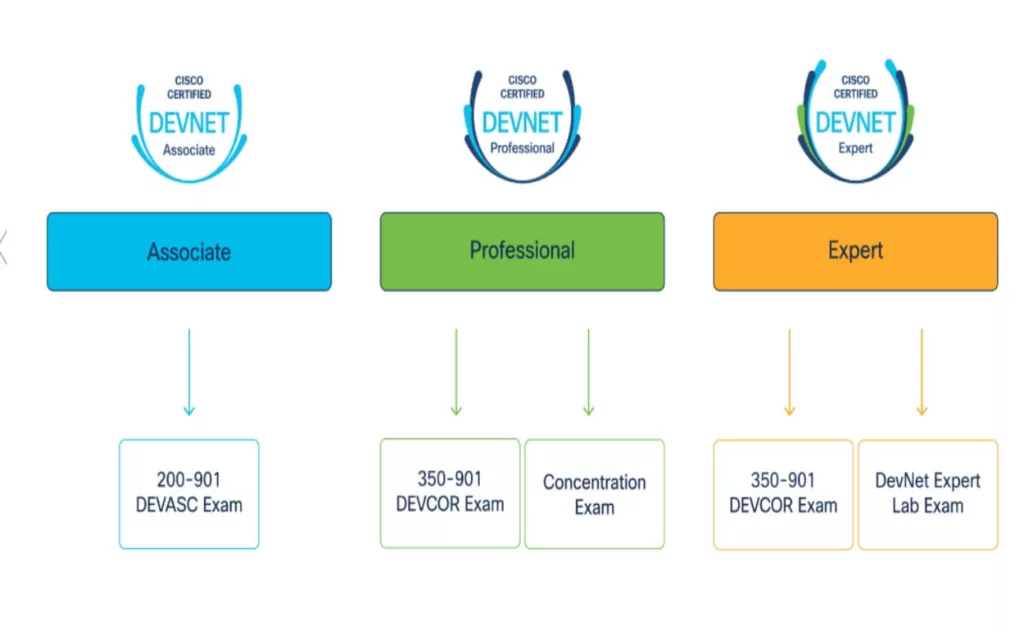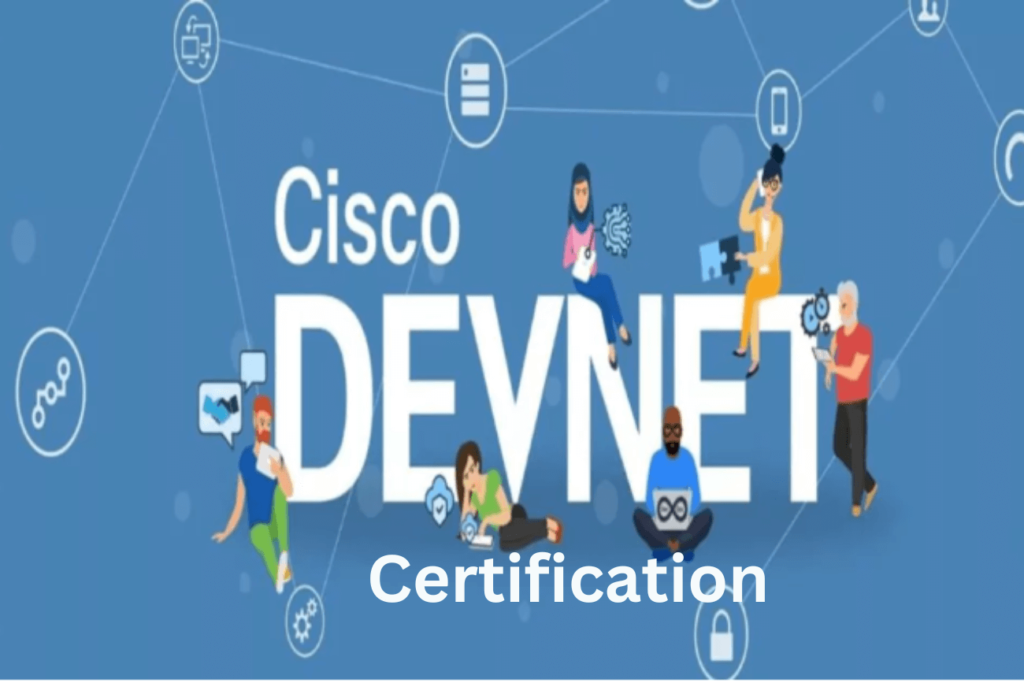Introduction
Most people are familiar with the general idea of career pathways like Networking, Cybersecurity, Cloud technology, etc even as beginners. However, the idea of DevNet as a career option is often not as clear-cut. This blog post will show some insights into the Cisco DevNet career and marketplace.
Do you know what the DevNet career or certification is all about? Do you think it might be a good IT career for you? It will explore the different DevNet certifications, opportunities, and some of the things you should know to better prepare for a career in this niche.
For starters, Cisco is primarily the vendor of choice when it comes to DevNet and it will also be the focus of this post. They are the largest vendor when it comes to Networking and are also the leading vendor for Automation -Something that has DevNet as part of its foundation. So let’s begin;
What is DevNet?
The Cisco DevNet is Cisco’s program for developers and IT professionals who want to write applications, integrations, or workflows using Cisco products as the base. Keeping in mind that the primary focus of developers is to solve problems and build things, the Cisco DevNet provides them with the tools (APIS and Platforms) to solve most efficiently.


This also applies to other IT professionals such as Network engineers who may want to simplify their management of a large collection of networking devices by automation, the Cisco DevNet skills allow them to use Cisco’s API and scripts to achieve the task.
The Cisco DevNet was launched in 2014 to help Engineers and IT professionals gain DevNet skills to run things more efficiently in an increasingly more complex work enterprise—saving cost, and time and reducing human error.
For DevNet professionals, there is much emphasis on hands-on practicals for solving problems, this makes innovation easy as you learn through practical experience.
What does a DevNet engineer do?
A DevNet Engineer or Professional will combine networking skills with the development of applications or integrations to improve the network. One of the most visible aspects of the job of a DevNet expert or Engineer is Automation. It is difficult to manage large networks without some level of automation. Generally, a DevNet Engineer or professional will be involved
- Network Automation to improve efficiency and reduce human errors
- Development of Applications for different environments such as Enterprise solutions or Collaboration
- Automation and development of network security
- Design of network infrastructure
The benefit of DevNet (Programmability) To The Industry
DevNet provides the tools that developers and IT professionals need to build solutions with Cisco platforms and Application Programming Interfaces (APIs). The following are some of the benefits of using the DevNet Programmability in your infrastructure;
- Automation of Network processes, which results in faster deployment time. No need to configure each device separately, automation saves valuable time
- Reduced cost and increased efficiencies and overall network optimizations
- Improved network availability by reducing human errors which are common with manually configuring devices. Inconsistencies of configurations are one of the major reasons for network breaks.
- It encourages innovations and business agility.
- Improved network security through different integrations.
DevNet Certifications Track and Specialization


Cisco offers the DevNet program under the Software Certification track and is in different skill levels. These include the DevNet Associate, The DevNet Specialist, the DevNet Professional, and the DevNet Expert.
Each of these caters to a different level of skillset. The complete list of the Cisco DevNet courses and their corresponding levels are in the list below;
| DevNet Certification Level | Associate Level | Specialist Level | Professional Level | Expert Level |
| Exam/Certification | Developing Applications & Automating Workflows using Cisco Platforms 200-901 DEVASC (One Exam) | Enterprise (300-435 ENAUTO) Data Center (300-635 DCAUTO) Security (300-735 SAUTO) Service Provider (300-535 SPAUTO) Collaboration (300-835 CLAUTO) Core Platform (350-901 DEVCOR) DevOps Sol&Prac.(300-910 DEVOPS) (One Exam) | 1 Core Exam (350-901 DEVCOR) + Any 1 Specialist (Concentration) Exam (Two Exams) | 1 Core Exam (350-901 DEVCOR) + Lab Exam DevNet Expert-Level Lab (One Exam + 1 Lab Exam) |
Cisco DevNet Associate Level (200-901 DEVASC)
The DevNet Associate Level Certification is the most basic certification for a career in network automation. It teaches the core knowledge of Cisco’s platform, APIs, and Programmability strategies – skills that are fundamental for implementing basic network applications.
Details of the DevNet Associate course can be found in Cisco’s Associate Level Certifications: Which Is the Best for You?
Cisco DevNet Specialist Certifications
The Cisco Certified DevNet Specialist focuses on developing and maintaining applications built on Cisco platforms. It only requires passing one of the core technology exams to be a Certified Specialist. It is for persons who have had some industry experience with application development, operations, security, or infrastructure.
The core Specializations include the Automation and Programming of the following Cisco technologies;
- Cisco Enterprise Solutions (300-435 ENAUTO)
- Cisco Security Solutions (300-735 SAUTO)
- Cisco Service Provider Solutions (300-535 SPAUTO)
- Cisco Collaboration Solutions (300-835 CLAUTO)
- Cisco Data Center Solutions (300-635 DCAUTO)
- Developing Applications using Cisco Core Platforms and APIs (350-901 DEVCOR)
- DevOps Solutions and Practices Using Cisco Platforms (300-910 DEVOPS)
The DevNet Specialization exams also doubles as the Core Exam for getting the Professional level Certification.
Cisco DevNet Professional Certification
The DevNet professional-level certification focuses on the design, development, maintenance, and deployment of applications on Cisco Infrastructure. It is a step beyond the DevNet Specialist Certification as it requires an additional concentration on specific aspects of the core technology.
The DevNet Certification requires two exams – one Core Exam (350-901 DEVCOR) and any one of the concentration exams listed below:
- Automating and Programming Cisco Enterprise Solutions 300-435 ENAUTO
- Automating and Programming Cisco Service Provider Solutions 300-535 SPAUTO
- Automating and Programming Cisco Data Center Solutions 300-635 DCAUTO
- Automating and Programming Cisco Security Solutions 300-735 SAUTO
- Automating and Programming Cisco Collaboration Solutions 300-835 CLAUTO
- Implementing DevOps Solutions and Practices 300-910 DEVOPS
More Details on the CCNP DevNet Certification are available THE CCNP CERTIFICATIONS PATHWAY – EXAMS,
Two Cisco’s DevNet concentration exams: Developing Solutions using Cisco IoT and Edge Platforms 300-915 DEVIOT And Developing Applications for Cisco Webex and Webex Devices 300-920 DEVWBX will no longer be offered from Jan.2024, hence are not included in this list.
Cisco DevNet Expert Certification


The Cisco DevNet Expert-level certification validates expert-level knowledge and proficiency in Network Automation, Programmability, and Secure Automation tools. It consists of two exams.
The DEVCOR 350-901 Exam and a Lab Exam. The Lab exam is an 8-hour live practical in complex software-driven network environments. You will be required to plan, design, develop, test, deploy, and maintain automation solutions.
The details of the DevNet Lab Exam Topics and details are available here. The Core exam is the same as those for the professional certifications.
The DevNet Certification Cost
The DevNet Exam costs $400 (350-901 DEVCOR), While the DevNet Associate Exams ( 200-901 DEVASC) and the various concentrations or Specialty exams cost $300. They all have a validity of 3 years after which you must recertify for the certification to remain valid.
The Cisco Expert-Level Lab Exams cost $1900 using Cisco Mobile exam kits or USD 1600 if you were to bring your own devices BYOD i.e. Laptop, Mouse, Keyboard, etc.
Tips To Pass the DevNet Exam


Cisco has a collection of Study and practice materials to help you prepare for DevNet exams at different levels. The following are some of the most helpful tips or strategies that can help you prepare for and pass DevNet exams.
1. Cisco Soundbox
The Soundbox is a free resource from Cisco that allows you to test your code and explore the different applications on the Cisco DevNet platform. It is the best place to learn especially if you are new to programming. You may need to make a reservation beforehand for you to be able to use the Soundbox. The Soundbox is a part of the developer’s community at https://developer.cisco.com/site/sandbox/
2. CCNA Foundations
DevNet requires you to know Networking at a satisfactory level. The CCNA is the most fundamental Cisco course/ certification that lays such foundations. It is helpful to be familiar with Networking (you may not need to sit for the CCNA exam). At the Associate DevNet exam, a sizeable portion of the exam topics are covered in the CCNA.
3. Git, Rest API, Python And Scripting Language
You must be familiar with Git, REST APIs, and Scripting Languages such as Python. Git is an open-source DevOps code management tool, that helps Developers track changes to their codes. REST ( Representational State Transfer) APIs help you “talk” with servers or different computers. Python is the most versatile programming language when it comes to automation. It is fairly easy to learn.
4. Join The Dev Community
It is very important to be a part of the Cisco developers community. It is a great place to learn through practicals and sharing of experience with other like-minded DevNet professionals. DevNet is heavily focused on practical skills and here are hundreds of free labs at https://developer.cisco.com/ to help you prepare for the exam. You will also find the documentation supporting the various lab exercises.
5. Use Study Practice Exam Questions
Familiarise yourself with Practice Exam questions. Find a Practice Exam Question that simulates the style and difficulty of the real exam. Boson Exsim is always a good choice. Even at the expert-level lab exam, Cisco recommends that you rent a lab to practice before sitting for the exam. (A 4-hour lab exam practice session at $50 from Cisco)
6. Personal Commitment And Study Plan
Not much can be achieved without some level of personal commitment to a achieve pass your DevNet exam. Having a large collection of Resource materials without studying them will do you no good if you cannot commit to studying them. Be accountable to yourself.
DevNet Job Roles
The different job roles you can get with the DevNet certifications are dependent on your level of expertise. They basically will center on Automation processes or development or designs in different Cisco environments. Some of the jobs according to the skill levels are highlighted below;
Associate DevNet Jobs
- Software Developer
- Network Automation Engineer
- System Integration Programmer
Specialist/Professional DevNet Jobs
- Network Designer
- Test Development Engineer (Senior)
- Infrastructure Architect
- System Integration Programmer (Senior)
- Senior Software Developer.
Expert DevNet Jobs
- Network Architect
- NetDevOps Team lead
- Senior Network Designer/Developer
- Senior Network Automation Engineer
Conclusion
The DevNet is Cisco’s program to train Developers and IT professionals to write applications, integrations, or workflows using Cisco platform tools. It is offered at the Associate, Specialist, Professionals, and Expert level.
The Associate and specialist levels require you to sit for a single exam. The Professional level demands that you pass a Core exam and 1 concentration exam. The Expert level also requires a Core exam and a lab exam. DevNets skills help you automate and manage a complex network more efficiently, saving cost and time.
To effectively prepare for DevNet, it is very important to practice hands-on in Cisco’s DevNet platform, deploy applications for free in the Sandbox Environment, learn Python and Scripting language, and make good use of the different documentation and resources.




